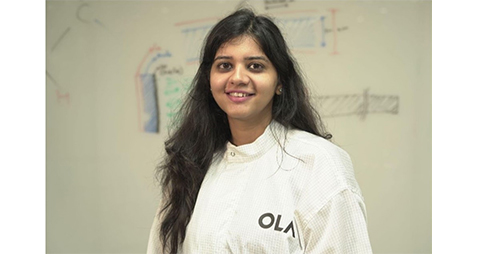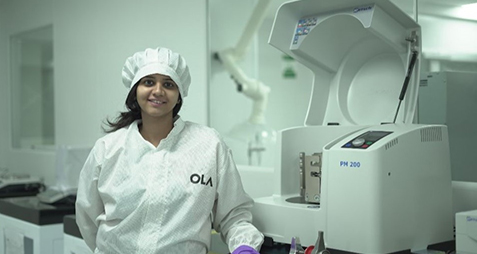
Dr. Neelakshi Sharma (Pilani, ‘20) is a Senior Research Engineer and Manager at the Battery Innovation Centre at Ola Electric, India. Having completed her Ph.D. in Condensed Matter and Materials Physics, she now looks after the development of batteries for Electric Vehicles, working closely with Lithium-ion batteries. Read on as she maps out the road ahead for the Electric Vehicle.
Looking back at your journey from being a PhD student at BITS Pilani to working at Ola Electric, how did your time at BITS shape your career path in this field?
I did my PhD in 2016 with Prof. Anshuman Dalvi on the electrolyte part of Lithium-ion batteries, which intrigued me. I had always wanted to do a Ph.D. in Experimental Physics as this was a very new and exciting field. Additionally, I got to organize and host several cultural events at BITS, giving me a platform to showcase my talents, including playing the guitar and debating. Despite being a Ph.D. student, I was involved in many extracurricular activities that usually undergraduates do. Earlier, I wanted to do a Post-Doc, but at BITS, I enjoyed making a difference in the product used by the end consumer. Here, I learnt to relate my academic knowledge to business and consumers.
What got you interested in the field of Lithium-ion batteries? Any advice for someone wanting to explore this field further?
Before 2016, I wanted to do a Ph.D. in solid state or plasma physics. My Professor told me about this project, where liquid Lithium batteries were replaced by solid-state batteries, offering superior properties. Attending international conventions and meeting researchers from this field further motivated me. In 2019, I got more passionate about this field when I learnt that three scientists had won the Nobel Prize for their research on Lithium-ion batteries. With the advent of EVs in the market, I recognized a lot of potential and decided, even after my study, to continue in the same field of work. I eat, sleep and just dream about Lithium-ion batteries now.

As a Senior Research Engineer at Ola, can you share some exciting projects you have been involved in? What were some of the challenges you faced?
When I joined Ola Electric in 2021, we were a small team of six people, and the company was just six months old in the Electric Vehicle industry. Our goal was to launch scooters by August 15. Initially, Ola Electric was procuring batteries from external sources, and my role was to test and validate incoming cells for performance. We were also in the works for planning our own facility in Bengaluru. I filed 10 patents for Ola Electric and over time, we established the Battery Innovation Centre and grew our team to 240 members. Seeing the 1st batch of Ola S1 on the road, we felt so proud since we had designed its heart. My manager believed in me and entrusted me with leadership. I now lead two teams, one focused on solid-state batteries and the other on conventional lithium-ion battery electrodes. So, starting from procuring it from outside to making it in-house has been quite the journey.
Looking ahead, how do you envision the future of battery technology for Electric Vehicles evolving?
In the next 10 years, the future of batteries lies in solid-state technology, that offers significant advantages over conventional Lithium-ion batteries. Companies like Toyota, Volkswagen, and Ola Electric are investing in a lot of battery research. Solid-state batteries provide improved safety, eliminating concerns of thermal runaway and fire hazards. This technology has the potential to revolutionize the Electric Vehicle industry, making it safer and more accessible to the masses and dispelling misconceptions surrounding EV safety.
Neelakshi ended by quoting Robert Frost’s poem Stopping by the Woods on a Snowy Evening which says, “I have miles to go before I sleep,” and that she’s just getting started.
You Might Also Like
- BITS to Baker Hughes: Shad Hussain’s Journey Through Turbulent Times
- Be Cool: Navigating Life, Literature, and Mental Health with Shashi Warrier
- Coaching Across Cultures: Brajesh Bajpai’s Journey of Learning, Leading, and Adapting
- From Engineer to AI Leader: An Interview with Akhil Singhal on Startups, Strategy, and the Future of Gen A
- From Circuits to Capital Markets: Deepak Joshi’s Global Finance Journey














